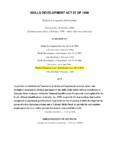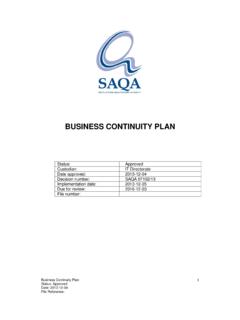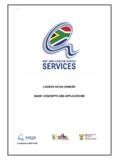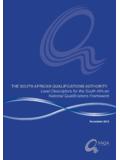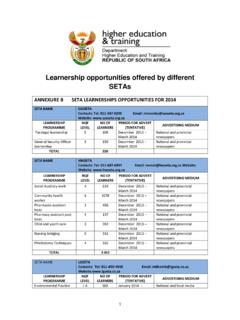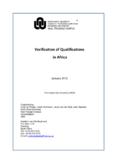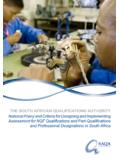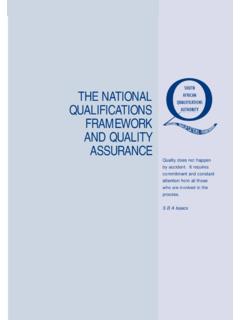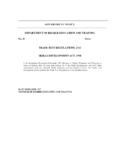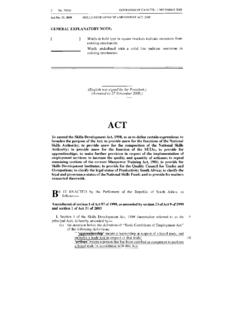Transcription of SKILLS DEVELOPMENT LEVIES ACT
1 SKILLS DEVELOPMENT LEVIES ACT 9 OF 1999 (English text signed by the President) [Assented To: 14 April 1999] [Commencement Date: 1 September 1999] as amended by: Revenue Laws Amendment Act 53 of 1999 Taxation Laws Amendment Act 30 of 2000 Revenue Laws Amendment Act 59 of 2000 Taxation Laws Amendment Act 5 of 2001 Revenue Laws Amendment Act 19 of 2001 Taxation Laws Amendment Act 30 of 2002 Revenue Laws Amendment Act 74 of 2002 Revenue Laws Amendment Act 45 of 2003 Taxation Laws Amendment Act 9 of 2005 Revenue Laws Second Amendment Act 32 of 2005 Taxation Laws Second Amendment Act 18 of 2009 SKILLS DEVELOPMENT LEVIES Amendment Act 24 of 2010 [ 7 December 2010] ACT To provide for the imposition of a SKILLS DEVELOPMENT levy; and for matters connected therewith.
2 ARRANGEMENT OF SECTIONS CHAPTER 1 ADMINISTRATION, IMPOSITION AND RECOVERY OF LEVY 1. Definitions2. Administration of Act3. Imposition of levy4. Exemptions5. Registration for payment of levy6. Payment of levy to Commissioner and refund6B..7. Payment of levy to SETA and refund7A. Estimated assessments8. Distribution of LEVIES paid to Commissioner9. Distribution of LEVIES paid to SETA10. Collection costs11. Interest on late payment12. Penalties on default13. Applicability of Income Tax Act CHAPTER 2 RECOVERY OF LEVY BY SETA 14. Recovery of levy 15. Appointment of inspectors 16. Powers of entry of inspectors 17. Powers of inspector to question and inspect 18.
3 Co-operation with inspectors 19. Undertakings and compliance orders CHAPTER 3 GENERAL PROVISIONS 20. Offences 20A. Jurisdiction of Courts21. Proof of accuracy of statement 22. Regulations 23. Amendment of SKILLS DEVELOPMENT Act 24. Short title and commencement Schedule - Amendment of SKILLS DEVELOPMENT Act CHAPTER 1 ADMINISTRATION, IMPOSITION AND RECOVERY OF LEVY 1. Definitions In this Act, unless the context otherwise indicates - approved body means the body approved by the Minister in terms of section 7(1)(b) to collect the levy on behalf of a SETA; Commissioner means the Commissioner for the South African Revenue Service, established by section 2 of the South African Revenue Service Act, 1997 (Act No.)
4 34 of 1997); Director-General means the Director-General of Higher Education and Training; [Definition of Director-General substituted by s. of Act 24/2010] employee includes an employee as defined in the Fourth Schedule to the Income Tax Act; employer includes an employer as defined in the Fourth Schedule to the Income Tax Act; Income Tax Act means the Income Tax Act, 1962 (Act No. 58 of 1962); interest means any interest payable in terms of section 11; levy means the SKILLS DEVELOPMENT levy referred to in section 3; Minister means the Minister of Higher Education and Training; [Definition of Minister substituted by s. 1 of Act 24/2010] National SKILLS Authority means the National SKILLS Authority, established by section 4 of the SKILLS DEVELOPMENT Act; National SKILLS Fund means the National SKILLS Fund, established by section 27(1) of the SKILLS DEVELOPMENT Act; penalty means any penalty payable in terms of section 12; prescribed means prescribed by regulation in terms of section 22; sector means a sector as determined by the Minister in terms of section 9(2) of the SKILLS DEVELOPMENT Act; SETA means a sector education and training authority, established by section 9(1) of the SKILLS DEVELOPMENT Act; SKILLS DEVELOPMENT Act means the SKILLS DEVELOPMENT Act, 1998 (Act No.
5 97 of 1998); this Act includes any regulation made in terms of section 22, but does not include the footnotes. 2. Administration of Act (1) Subject to subsection (2), the Director-General must administer this Act. (2) The Commissioner must administer the provisions of the Act in so far as it relates to the collection of the levy payable to the Commissioner in terms of this Act. (3) The Director-General may delegate any part of the administration of this Act, contemplated in subsection (1), to the executive officer of a SETA. (4) A delegation in terms of subsection (3) - (a) is subject to the conditions the Director-General determines; (b) must be in writing; (c) does not prevent the Director-General from performing the part of the administration so delegated; and (d) may at any time be withdrawn in writing.
6 3. Imposition of levy (1) Every employer must pay a SKILLS DEVELOPMENT levy from - (a) 1 April 2000, at a rate of 0,5 per cent of the leviable amount; and (b) 1 April 2001, at a rate of one per cent of the leviable amount. (2) .. [Subs. (2) deleted by s. 111 of Act 53/99] (3) .. [Subs. (3) deleted by s. 111 of Act 53/99] (4) For the purposes of subsections (1), (2) and (3), but subject to subsection (5), the leviable amount means the total amount of remuneration, paid or payable, or deemed to be paid or payable, by an employer to its employees during any month, as determined in accordance with the provisions of the Fourth Schedule to the Income Tax Act for the purposes of determining the employer s liability for any employees tax in terms of that Schedule, whether or not such employer is liable to deduct or withhold such employees (5) The amount of remuneration referred to in subsection (4) does not include any amount -- (a) paid or payable to any person contemplated in paragraphs (c) and (d)
7 Of the definition of employee in paragraph 1 of the Fourth Schedule to the Income Tax Act, to whom a certificate of exemption has been issued in terms of paragraph 2(5)(a) of that Schedule; (b) paid or payable to any person by way of any pension, superannuation allowance or retiring allowance; (c) contemplated in paragraphs (a), (d), (e) or (eA) of the definition of gross income in section 1 of the Income Tax Act; (d) payable to a learner in terms of a contract of employment contemplated in section 18(3) of the SKILLS DEVELOPMENT Act. (e) which is in terms of paragraph 11 C of the Fourth Schedule to the Income Tax Act, 1962, deemed to be paid or payable by an employer which is a private company for purposes of that Act, to any person who is a director of that private company.
8 [Para. (e) added by s. 61 of Act 30/2002] (6) Despite subsection (1), on the request of a SETA, the Minister may, in consultation with the Minister of Finance and by notice in the Gazette, determine from time to time a rate and basis for the calculation of a levy payable by employers within the jurisdiction or a part of the jurisdiction of a SETA, different from the rate and basis contemplated in subsection (1)(a) or (b), as the case may be, but subject to subsection (7). (7) The rate and basis determined in a notice in terms of subsection (6) may not have the result that the amount of the LEVIES collected by virtue of such notice is less than the amount of the LEVIES which would have been collected, based on the rate and basis contemplated in subsection (1)( a) or (b), as the case may be.
9 (8) The Minister may, in consultation with the Minister of Finance, determine criteria for purposes of any determination contemplated in subsection (6). (9) The notice referred to in subsection (6) must contain - (a) the rate and basis for the calculation of the levy; (b) the date on which the levy becomes payable; (c) a description of the employers falling within the jurisdiction of the SETA or part of the jurisdiction of the SETA in respect of which the levy is payable; (d) any other matter necessary to ensure the effective collection of the levy. _____ 1. This means that the remuneration paid to employees below the Income Tax threshold must be incorporated into the remuneration for determining the leviable amount in this Act.
10 4. Exemptions The levy is not payable by - (a) any public service employer in the national or provincial sphere of government; (b) any employer where section 3(1)(a) or (b) applies and during any month, there are reasonable grounds for believing that the total amount of remuneration, as determined in accordance with section 3(4), paid or payable by that employer to all its employees during the following 12 month period will not exceed R500 000; [Para. (b) substituted by s. 24 of Act 9/2005] (c) any public benefit organisation contemplated in section 10(1)(cN) of the Income Tax Act, which- (i) solely carries on any public benefit activity contemplated in paragraphs 1, 2 (a), (b), (c) and (d) and 5 of Part I of the Ninth Schedule to that Act; or (ii) solely provides funds to public benefit organisations contemplated in subparagraph (i); or [Para.]
